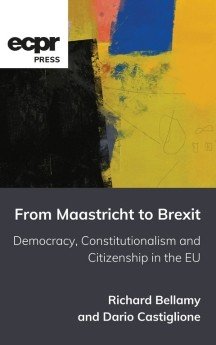From Maastricht to Brexit: Democracy, Constitutionalism and Citizenship in the EU
ഈ ഇ-ബുക്കിനെക്കുറിച്ച്
The last few years have been difficult both economically and politically, while its integrative function and legitimacy have been seriously tested. For many social, economic and geo-political reasons, its expansionary moment has stopped abruptly. On the contrary, the Greek economic crisis and the Brexit referendum have raised the spectre of fragmentation and political disintegration. The promise of the EU as a possible model for legitimate governance beyond the nation state lies somewhat in tatters. Even if the EU may indeed survive most of its current crises, is the project of a EU as a normative project beyond rescue?
Ever since Maastricht, the democratic legitimacy of the EU has been a key concern of policy makers, citizens and academics alike. This issue is essentially a normative one, and over the same period our work in this area has been at the forefront in exploring what has come to be known (following an early working paper we wrote with this title in 2000) 'the normative turn in EU studies'. The debate on the democratic form and legitimacy of the EU is one that has gone on for some time and to which we, together with other scholars, have tried to contribute in the course of the last twenty years or so. Collecting articles written over the course of this period is not just meant as the testimony of an intellectual journey, but also a way of tracing such a journey in retrospect and mapping the important moments of the intellectual and scholarly debates that have contributed to shaping both our understanding and our expectations of the EU's possible futures.
രചയിതാവിനെ കുറിച്ച്
Richard Bellamy is Director of the Max Weber Programme at the EUI and Professor of Political Science, University College London (UCL), University of London. Recent publications include Liberalism and Pluralism: Towards a Politics of Compromise (Routledge, 1999), Rethinking Liberalism (Continuum, 2000, 2005), Political Constitutionalism: A Republican Defence of the Constitutionality of Democracy (Cambridge University Press, 2007), Citizenship: A Very Short Introduction (Oxford University Press, 2008), Croce, Gramsci, Bobbio and the Italian Political Tradition (ECPR Press, 2014) and (as co-editor) The Cambridge History of Twentieth Century Political Thought (Cambridge University Press, 2003), Lineages of European Citizenship (Palgrave, 2004) and Making European Citizens (Palgrave, 2006). His A European Republic of Sovereign States is forthcoming from Cambridge University Press.
Dario Castiglione is Reader in Political Theory at the University of Exeter. His recent publications include (as co-editor) The History of Political Thought in National Context (CUP, 2001), Making European Citizens (Palgrave, 2006), The Culture of Toleration in Diverse Societies: Reasonable Tolerance, (Manchester University Press, 2003), The Language Question in Europe and Diverse Societies (Hart Publishers, 2007), The Oxford Handbook on Social Capital (OUP, 2008); and the forthcoming Giving Presence: The New Politics of Democratic Representation (Chicago University Press); (as co-author) Constitutional Politics in the EU: The Convention Moment and its Aftermath (Palgrave, 2007).






